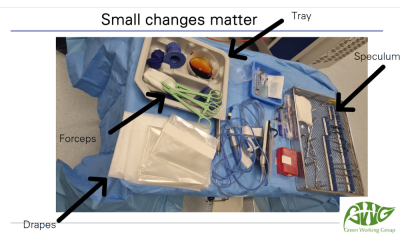A Royal Free London (RFL)
Radhika Rampat has been leading on a sustainable ophthalmology project in the trust and further afield, which has garnered support and attention from a range of NHS trusts, healthcare organisations and industry leaders across the world.
“I’ve always been interested in doing quality improvement projects, which end up saving money or carbon emissions in some way,” Radhika explained.
“About two and a half years ago I was asked to do a session on sustainability and young ophthalmologists at the American-European Congress of Ophthalmic Surgery (AECOS). I started at the RFL a few months after that first presentation, and decided to create a project that we could present every year to show our findings over a period of time.”
The crux of the issue came from the sheer volume of products that are used in ophthalmology.
“Procedures are fast and short, and we produce a lot of carbon emissions by proxy,” Radhika said. “Three projects have been our focus so far, and they have been really successful.”
The first project looks at medicine optimisation, ensuring that single-use containers are avoided through working with Mr Rohit Jolly, clinical lead, the Greener RFL team and pharmacy colleagues.
“We were using all of these single dose units which were getting thrown away quickly.
“I got a weighing scale and weighed the boxes with the single dose units, and then weighed new bottles that were coming out that provide the same preservative free medication but last for a month or more. The calculations found that we were saving upwards of 70% plastic, and turned out that the price was 50% less, so it was really a no brainer.”

An overview of some of the instruments used in ophthalmology.
A second project followed on from an audit of recyclable material, led by Anne-Marie Williams, sister in charge the Edgware Community Hospital surgical hub, as the department typically would use delicate instruments that can break easily.
“We audited the number of times someone would receive a bent or broken instrument and then ask for a single-use one instead, which weren’t recycled,” Radhika explained.
“I looked at another company who create high-grade pure stainless steel materials which are recyclable. We now have bins for those specific instruments to be recycled, and there has been an £8,000 saving on just seven instruments, but we hope to look at more.”
Bin placement was at the centre of the third project to ensure staff are disposing of material correctly.
“We are now making sure we are placing them in the right areas to increase their use.
“We have created QR codes which are live so that as changes happen and more things can be recycled, we just need to update the information that the QR code displays rather than printing new labels.”
Radhika says:
“Everyone is engaging with it here and helping push the work along. Between the green team and the consultant body, Sharpsmart to pharmacy, and the creation of a sustainability warden in the department. Everyone has worked as a team and we have been able to push things forward.
“We are now looking at how we can work with other departments in a more collaborative way and use our findings to offer suggestions and guidance.”
Radhika plans to continue bringing the three main projects to fruition, alongside working with North Central London Integrated Care Board and continuing international work.
She also hopes to begin working with industry to bring about regulatory changes.
 Translate
Translate